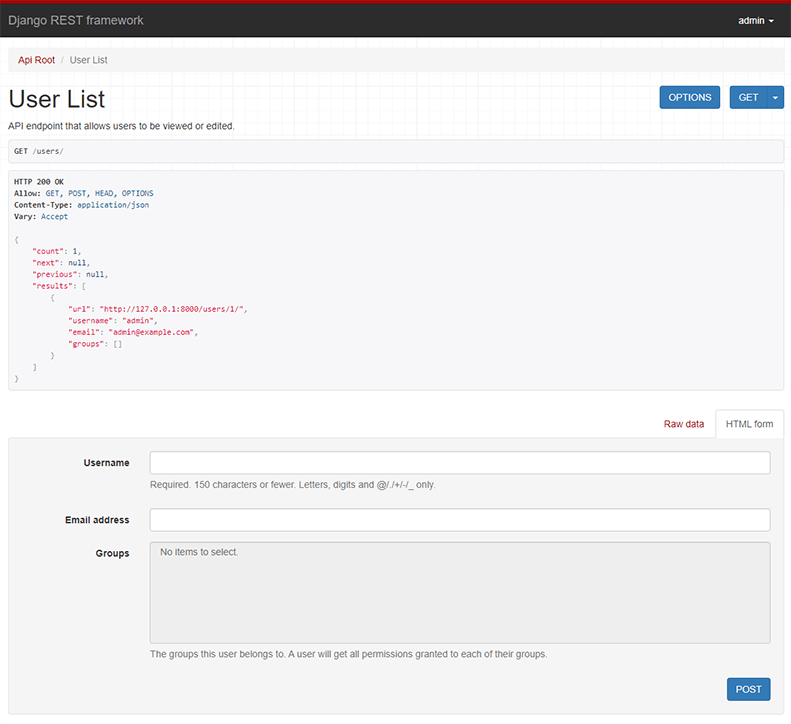| docs | ||
| rest_framework | ||
| .gitignore | ||
| .travis.yml | ||
| MANIFEST.in | ||
| mkdocs.py | ||
| optionals.txt | ||
| README.md | ||
| requirements.txt | ||
| setup.py | ||
| tox.ini | ||
Django REST framework
Awesome web-browseable Web APIs.
Note: Full documentation for the project is available at http://django-rest-framework.org.
Overview
Django REST framework is a powerful and flexible toolkit that makes it easy to build Web APIs.
Some reasons you might want to use REST framework:
- Modular and decoupled architecture that stays close to Django idioms throughout.
- The Web browseable API is a huge useability win for your developers.
- Authentication policies including OAuth1a and OAuth2 out of the box.
- Permission policies including support for the Django contrib permissions.
- Serialization that supports both ORM and non-ORM data sources.
- Customizable all the way down. You can just use regular function based views if you don't need the more powerful features.
- Extensive documentation, and great community support.
There is a live example API for testing purposes, available here.
Below: Screenshot from the browseable API
Requirements
- Python (2.6.5+, 2.7, 3.2, 3.3)
- Django (1.3, 1.4, 1.5)
Installation
Install using pip...
pip install djangorestframework
Add 'rest_framework' to your INSTALLED_APPS setting.
INSTALLED_APPS = (
...
'rest_framework',
)
If you're intending to use the browseable API you'll probably also want to add REST framework's login and logout views. Add the following to your root urls.py file.
urlpatterns = patterns('',
...
url(r'^api-auth/', include('rest_framework.urls', namespace='rest_framework'))
)
Note that the URL path can be whatever you want, but you must include 'rest_framework.urls' with the 'rest_framework' namespace.
Example
Let's take a look at a quick example of using REST framework to build a simple model-backed API.
We'll create a read-write API for accessing users and groups.
Here's our project's root urls.py module:
from django.conf.urls.defaults import url, patterns, include
from django.contrib.auth.models import User, Group
from rest_framework import viewsets, routers
# ViewSets define the view behavior.
class UserViewSet(viewsets.ModelViewSet):
model = User
class GroupViewSet(viewsets.ModelViewSet):
model = Group
# Routers provide an easy way of automatically determining the URL conf
router = routers.DefaultRouter()
router.register(r'users', views.UserViewSet, name='user')
router.register(r'groups', views.GroupViewSet, name='group')
# Wire up our API using automatic URL routing.
# Additionally, we include login URLs for the browseable API.
urlpatterns = patterns('',
url(r'^', include(router.urls)),
url(r'^api-auth/', include('rest_framework.urls', namespace='rest_framework'))
)
Documentation & Support
Full documentation for the project is available at http://django-rest-framework.org.
For questions and support, use the REST framework discussion group, or #restframework on freenode IRC.
You may also want to follow the author on Twitter.
License
Copyright (c) 2011-2013, Tom Christie All rights reserved.
Redistribution and use in source and binary forms, with or without modification, are permitted provided that the following conditions are met:
Redistributions of source code must retain the above copyright notice, this list of conditions and the following disclaimer. Redistributions in binary form must reproduce the above copyright notice, this list of conditions and the following disclaimer in the documentation and/or other materials provided with the distribution.
THIS SOFTWARE IS PROVIDED BY THE COPYRIGHT HOLDERS AND CONTRIBUTORS "AS IS" AND ANY EXPRESS OR IMPLIED WARRANTIES, INCLUDING, BUT NOT LIMITED TO, THE IMPLIED WARRANTIES OF MERCHANTABILITY AND FITNESS FOR A PARTICULAR PURPOSE ARE DISCLAIMED. IN NO EVENT SHALL THE COPYRIGHT HOLDER OR CONTRIBUTORS BE LIABLE FOR ANY DIRECT, INDIRECT, INCIDENTAL, SPECIAL, EXEMPLARY, OR CONSEQUENTIAL DAMAGES (INCLUDING, BUT NOT LIMITED TO, PROCUREMENT OF SUBSTITUTE GOODS OR SERVICES; LOSS OF USE, DATA, OR PROFITS; OR BUSINESS INTERRUPTION) HOWEVER CAUSED AND ON ANY THEORY OF LIABILITY, WHETHER IN CONTRACT, STRICT LIABILITY, OR TORT (INCLUDING NEGLIGENCE OR OTHERWISE) ARISING IN ANY WAY OUT OF THE USE OF THIS SOFTWARE, EVEN IF ADVISED OF THE POSSIBILITY OF SUCH DAMAGE.

